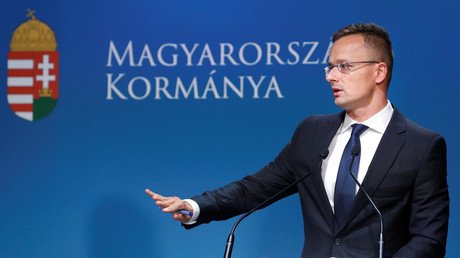EU's 'dangerous' move to punish Hungary 'reveals its authoritarian grip'
The EU parliament's vote to trigger Article 7, allowing punitive measures against Hungary, has provoked disbelief and indignation, with commentators describing the "authoritarian" move as contrary to the bloc's own self-interests.
Citing Hungary's anti-immigration policies and concerns about "media suppression," the European Parliament voted on Wednesday to invoke the provision, known as the 'nuclear option,' which is applied when there is "a clear risk of a serious breach" of EU values by one of the member states.
Voting against its own interests
Implementing Article 7 allows for sanctions to be imposed on Budapest, including stripping the nation of its voting rights in the European Council. The motion, which passed 448-197 with 48 abstentions, was roundly condemned by prominent Eurosceptics. Former UKIP leader and champion of Brexit, Nigel Farage, warned that the vote revealed the ever-tightening "authoritarian grip" of the European Union.
European Parliament votes to remove Hungary’s voting rights, the authoritarian grip of the EU gets even tighter.
— Nigel Farage (@Nigel_Farage) September 12, 2018
But those who support the European project and are working towards a more unified bloc should also be outraged, British historian, philosopher and author John Laughland told RT.
"It's amazing to me that the European Parliament has done this. From their own point of view, for their own institutional self-interest, it's crazy."
The vote will likely also galvanize anti-immigration parties ahead of European Parliament elections to be held in May, Paolo Raffone, a political analyst and founder of the CIPI Foundation, a Brussels-based think tank, said.
"This is a very dangerous type of action from the parliament, because on the issues of values, there's a lot of debate in European society."
He told RT that the recent successes of Eurosceptic political movements across Europe should serve as a wake-up call to Brussels.
"There is a clear trend of populist-nationalist parties making gains throughout Europe," Raffone said, adding that it would be unwise of some of Europe's most powerful states, including France and Germany, to think that they are immune to the growing tide of Euroscepticism.
Setting Hungary straight?
Still, the vote clearly served the purpose of making an example of Budapest, which has challenged Brussel's open-door migrant policy and the bloc's concept of "European values."
Laughland said that the vote sets a clear precedent that puts other EU states on notice. Last December, Article 7 was triggered against Poland, marking the first time the measure was implemented.
But will the 'nuclear option' achieve the desired results?
Independent journalist Luc Rivet told RT that the vote accomplished little aside from "victimizing" Hungarian Prime Minister Viktor Orban, whose popularity with Hungarians is only likely to increase. While the vote's outcome was expected, what was truly shocking was the language used by MEPs – and even senior EU officials – while denouncing Orban during a debate in parliament on Tuesday.
European Commission vice president Frans Timmermans said that Orban had chosen a "coward's way out" by claiming that the EU was targeting the whole of Hungary, rather than just its government. MEPs also hurled insults at Orban, with Guy Verhofstadt, the former Belgian prime minister, describing the Hungarian leader as a neo-fascist.
Rivet said that these comments revealed an astonishing rift in the bloc's sense of unity.
"The worst that Europe can produce – we heard yesterday and today … This bullying will go nowhere because Article 7 will never be applied. Italy, Austria and Poland will refuse of course that this be applied, at council level, if not at parliament level."
'A conflict between intelligence and stupidity'
Laughland also took aim at the report authored by Dutch Green MEP Judith Sargentini, which was used to determine that there is a "clear risk" that Hungary could be undermining the values of the European Union. He called the report a "grotesque exercise in disinformation, which is full of half-truths and untruths, which really does great to discredit to the woman who drew it up."
Rivet echoed a similar sentiment, describing the report authored by Sargentini as "a piece of work."
"It's really incredibly aggressive in its content, and she didn't even go to Hungary to make this report. She only relied upon sources like Mr. George Soros and his friends. So really it's incredible."
For Laughland, Sargentini's report illustrates two very distinct European worldviews.
"When you compare it to the Hungarian government's response, you can see that you are dealing on the one hand with intelligence, with people who are intelligent and civilized, and on the other hand with someone who is stupid and malicious. And in a way I think that's the most frightening aspect of it – this conflict between intelligence and stupidity, or between civilized behavior and nastiness."
Like this story? Share it with a friend!
















